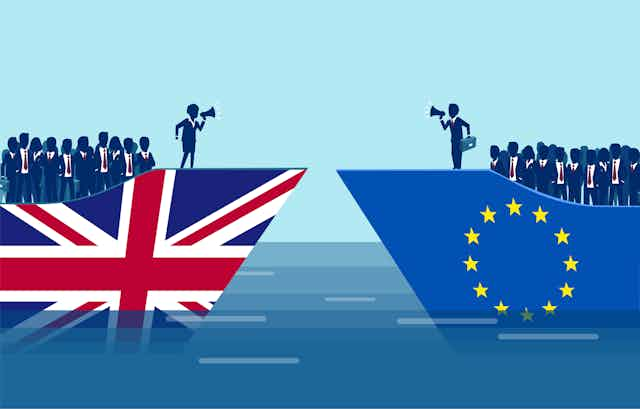The UK’s ability to negotiate its own trade deals post-Brexit was central to Boris Johnson’s election-winning manifesto. Johnson’s “oven-ready” Brexit deal will keep the country out of the EU single market and any form of customs union, which will allow it to set an independent trade policy. His party promised to “Get Brexit done” in order to “unleash” the UK’s potential.
But how does the public feel about this? Do they really think that new trade deals will be beneficial?
Our research addresses this question based on a public opinion survey of more than 2,000 respondents. We find that there is a high level of support for international trade in general terms, with the public broadly believing it brings economic benefits to the UK. But the public is more divided when it comes to free trade agreements following Brexit. So the government faces considerable challenges if it is to win broad public support for post-Brexit trade agreements, a new relationship with the EU based on free trade, and pursue its vision of a “Global Britain”.
Two-thirds (66%) of the UK population expressed very or fairly positive views towards international trade. International trade is also seen more positively than globalisation (only 37% being very or fairly positive toward this), immigration (46% being very or fairly positive) and much more so than Brexit (31% being very or fairly positive). The public is therefore broadly supportive of a vision of the UK as an outward-facing country in which free trade is central.
Support for international trade also seems to cut across party lines, with majorities of supporters from all the main parties expressing positive views. Interestingly, however, Leavers are more likely to hold a favourable view of international trade (73%; compared to 63% for Remainers), despite being more negative about globalisation overall (32% compared to 42%).

Brexit complicates things
When you ask people about new trade agreements specifically in the context of Brexit, the public is split: 42% holding positive and 41% holding negative impressions of new trade deals after Brexit. This could reflect the critical reception that trade deals have received in the media, as illustrated by the debates on whether Brexit would result in Britain importing sub-standard food from the US (for example, chlorinated chicken) or the extent to which the NHS will be included in such deals and will ultimately be privatised.

Importantly, public opinion on trade deals and their benefits is to a large extent informed by attitudes towards Brexit. While Remainers overwhelmingly oppose new trade agreements after Brexit, Leavers express strong support. Only 21% of Remainers view potential new trade agreements after Brexit in a positive light. In contrast, an overwhelming 73% of Leavers support such deals.
The data also show that 13% of Leavers have negative views of potential new trade agreements after Brexit and 14% do not know. This suggests that it is wrong to assume that all Brexit supporters will unequivocally support any government’s attempt to secure new free trade agreements in the future.

Brexit divisions are also becoming reflected by partisanship. Support for new trade deals after Brexit is overwhelmingly seen among right-wing party supporters, whereas we find opposition among left-wing party supporters. Positive impressions of potential new trade agreements among Conservative (72%) and Brexit Party (85%) voters compare to much lower proportions of Labour (22%), Liberal Democrats (19%) and Green Party supporters (25%).
Thus, attitudes towards free trade agreements differ from their attitudes towards trade in general terms. For example, it is particularly notable that Liberal Democrat and Labour supporters are positive to international trade but not to potential trade deals after Brexit.
So there is a great difference between supporting free trade in abstract terms on the one hand, and supporting specific trade agreements on the other. There are also major divisions along both Brexit and partisan lines.
What does this mean in practice?
It has been argued that the UK government faces practical challenges to its “Global Britain” strategy because it seeks post-Brexit trade deals at a time when global trade integration has stalled since the financial crisis and is unlikely to pick up steam any time soon.
Our findings suggest that public opinion is likely to pose an additional constraint to the Johnson government’s attempts to strike post-Brexit trade deals. This is because there are significant underlying divisions that are very likely to emerge once trade negotiations start. Free trade agreements are likely to become another platform for political and economic grievances.
As trade-offs become more apparent – issues such as food safety and costs to the NHS – there is a strong reservoir of negative public opinion that can turn against the government and weaken its negotiating position. These divisions can undermine its ability to strike successful trade deals. As shown with TTIP, the stalled trade deal between the EU and US, public opinion has the potential to derail agreements.
Plus, trade policy will benefit different parts of the country and sectors of the economy more than others. Trade negotiations raise a number of issues in terms of who wins and who loses out. Given that the Conservative Party drew support from a mixed electorate – including high-level managerial, professional groups but also skilled and unskilled manual workers – it will prove difficult to broker deals that satisfy everyone.

